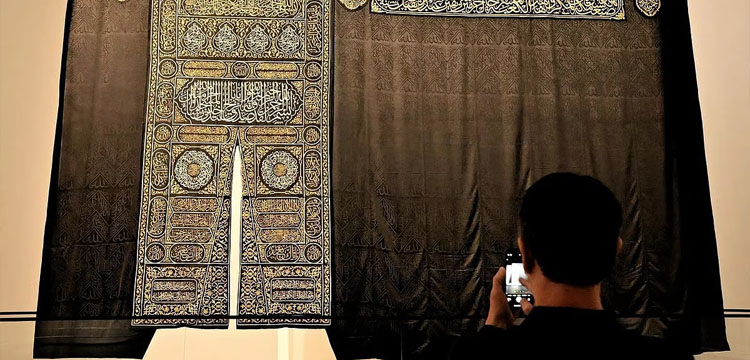
For the first time in history, the sacred covering of the Holy Kaaba, known as the Kiswa, is being exhibited outside Makkah, offering visitors a unique opportunity to witness its intricate craftsmanship up close.
The Kiswa, which Muslims around the world face in prayer, is being showcased at the Islamic Arts Biennale held at King Abdulaziz Airport in Jeddah.
This interactive display provides insight into the detailed artistry involved in its creation, from hand-weaving to embroidery with gold and silver threads.
The event, running until May 25, aims to highlight the rich heritage of Islamic arts and the centuries-old tradition of Kiswa-making.
Read More: Saudi Arabia opens Hajj 2025 registration for domestic pilgrims
Held at the Hajj terminal of Jeddah airport, the exhibition takes visitors through the meticulous process of crafting the Kiswa from selecting the finest silk to the final stages of preparation before it adorns the Holy Kaaba in Makkah.
The manufacturing of the Kiswa takes place at the King Abdulaziz Complex in Makkah, where over 200 artisans and administrative staff work on its production.
The complex features specialized departments for dyeing, weaving, printing, and embroidery, equipped with the world’s tallest computerized sewing machine.
Approximately 1,000kg of black-dyed silk is used for the Kiswa, along with 120kg of gold threads and 100kg of silver threads.
Each year, on the first day of the Islamic lunar Hijri year, the Kiswa is replaced in a grand ceremony at the Grand Mosque in Makkah, Islam’s holiest site.
The biennale also explores the historical evolution of Kiswa-making, showcasing the advanced artistic techniques that have been used over the centuries to maintain the spiritual and cultural significance of this sacred cloth.
Earlier, the Saudi Ministry of Hajj and Umrah has announced the opening of Hajj 2025 registration for domestic pilgrims, including citizens and residents, urging applicants to submit their requests through the Nusuk app or the official e-portal.
The ministry emphasized the importance of early registration, advising applicants to complete their health information, add accompanying pilgrims, and submit requests for exemption from the Mahram requirement if needed.
from ARY NEWS https://ift.tt/L76JQ0m
